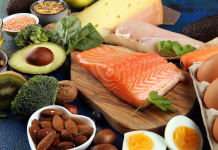Your diet affects your physical health and mental health. Food provides your brain and body with the nutrients they need to function; therefore, it’s essential to feed them well.
Is there an optimal diet for mental health?
Could you improve your mental health and possibly reduce symptoms of depression just by eating certain foods?
It can be challenging to find the motivation, appetite or energy to eat when depressed. Furthermore, symptoms of depression are also associated with making unhealthy food choices, such as eating more sugary foods and reducing the variety of things we eat.
One study found that poor nutritional choices, reduced day-to-day functioning and emotional changes can exacerbate one another and become a vicious cycle.
However, seeing yourself as worthy of self-care and therefore worthy of being fed with nutritious food is an excellent step toward better mental health. Improving your diet may help to improve your mood, give you more energy, and help you think more clearly.
Here are some realistic steps on the way to better nutrition options if you’re feeling low:
Increase Essential Fats
Omega 3 are essential fatty acids that the body needs for brain function and cell growth. Unlike some other substances, they cannot be manufactured within the human body. Therefore they must be present in your diet. The richest dietary sources of omega-3 fats are oily fish such as salmon, sardines, mackerel, pilchards, herring, and trout.
Balance Blood Sugar Levels
There is a direct link between mood and blood sugar balance. All carbohydrate foods are broken down into glucose, and your brain runs on glucose. Sugar breaks down very quickly in the body, and we can experience sharp rises in the amount of glucose in the blood. The more unstable your blood sugar supply, the more unstable your mood can be.
With blood sugar ups and downs, we can feel tired, irritable, experience dizziness, insomnia, excessive sweating (especially at night), poor concentration and forgetfulness, excessive thirst, low moods, digestive disturbances and blurred vision.
Refined sugar and refined carbohydrates (meaning white bread, pasta, rice, sweets and most processed foods) are also linked with depression because eating lots of sugar also depletes levels of vitamin B.
Increase intake of vitamin B.
Some good sources of Vitamin B are whole grains, meat and poultry, fish, eggs and dairy products, legumes, seeds and nuts, dark green leafy vegetables.
Try Probiotics
More and more research is linking good gut health with good mental health. Several studies have found that microorganisms living in your gut, including probiotics, can play a crucial role in mood regulation by helping to reduce inflammation in your body, producing feel-good neurotransmitters, and having a positive effect on your stress response.
Foods that contain probiotics include Kimchi, Kombucha, Miso, Sauerkraut, Tofu and Yoghurt.
Exclude processed food
Try to avoid anything which lists trans fats or partially hydrogenated oils in the list of ingredients (such as some shop-bought cakes and biscuits). They can be tempting when you’re feeling low, but this kind of fat isn’t good for your mood or your physical health in the long run.


























